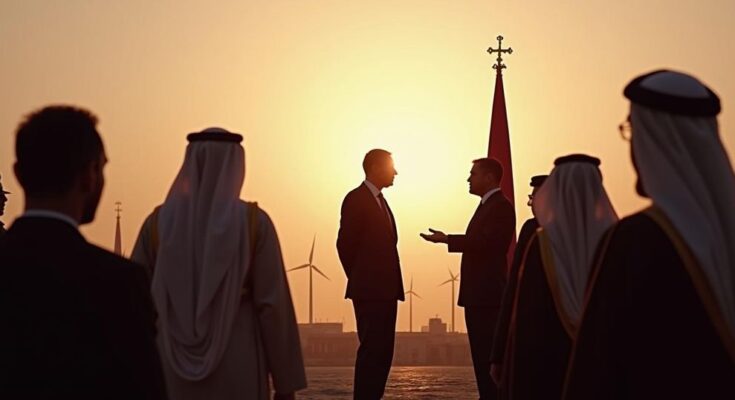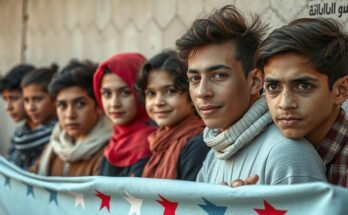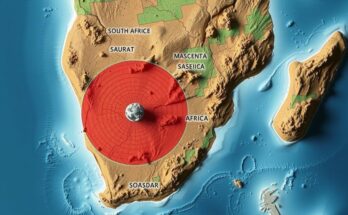Iranian President Masoud Pezeshkian visits Qatar for diplomatic engagements, including participation in the Asian Cooperation Dialogue Summit, amidst Iran’s aim to strengthen ties with regional powers. Concurrently, Iranian ground forces conduct joint military training with Oman, underscoring Iran’s efforts to enhance its influence in the region amidst ongoing conflicts.
Iranian President Masoud Pezeshkian is scheduled to visit Qatar on Wednesday, as reported by Iranian state media. This visit follows his recent participation in the UN General Assembly in New York and a meeting with the Prime Minister of Russia earlier this week. Pezeshkian’s proactive approach to international diplomacy underscores Iran’s intention to strengthen its diplomatic relationships amidst ongoing conflicts involving its proxies in Israel. In Doha, the president will engage with the Emir of Qatar and attend the 19th Asian Cooperation Dialogue (ACD) Summit, following an invitation from Sheikh Tamim bin Hamad bin Khalifa Al Thani. The trip is set to last two days, during which high-ranking officials from both nations will convene and sign several cooperation agreements. Qatar’s relationship with Hamas and its critical stance towards Israel are noteworthy, especially as Doha has been urged to mediate a ceasefire between Hamas and Israel. Nevertheless, current geopolitical dynamics suggest that such negotiations may face significant challenges. Iran’s effort to cultivate a closer partnership with Qatar aligns with a broader regional strategy that includes collaboration with Turkey, Russia, and China, particularly against Israeli interests. The ACD, founded in 2002, aims to foster an inclusive Asian community through cooperation amongst member countries, avoiding conflictual alignments. Iran’s membership in groups like BRICS and the SCO further exemplifies its intent to deepen ties with other Asian powers. Compounding these diplomatic efforts, Iranian state media has announced that Iranian ground forces are currently undertaking their first joint military training exercise with Oman. Coinciding with President Pezeshkian’s trip, this exercise, named Mountain Falcons 1, commenced on Monday in Oman’s Jebel Al-Khader province. The collaboration involves the Iranian Army’s ground forces alongside their Omani counterparts, with support from Omani Air Forces and Royal Police, aimed at enhancing joint combat training and readiness. Oman has historically maintained a neutral stance in regional disputes. Its growing ties with Iran, amid external pressures from the Gulf states, reflect its unique geopolitical position. Notably, its proximity to Yemen, where Iranian-backed Houthis are active, raises important considerations for regional stability despite Oman’s perception as a peaceful state. The cooperation between Iranian and Omani forces might raise concerns, yet the distinction between the Iranian ground forces and the more ideologically driven Islamic Revolutionary Guard Corps suggests a more pragmatic approach to security in the region. For Iran, security also implies a capacity for influence and destabilization in various arenas, though Oman is generally viewed as a stable partner.
This article discusses the diplomatic and military activities involving Iran, particularly focusing on President Masoud Pezeshkian’s upcoming visit to Qatar and the subsequent military training exercises with Oman. It highlights Iran’s strategic efforts to strengthen ties with regional powers amidst its opposition to Israel and the ongoing geopolitical complexities in the Middle East. The significance of the ACD and Iran’s membership in various economic groups illustrate the broader context of Iran’s foreign policy objectives as it seeks to enhance cooperation and influence within Asia.
In conclusion, President Masoud Pezeshkian’s trip to Qatar and the joint military exercises with Oman represent critical facets of Iran’s current foreign policy strategy. As Iran seeks to foster closer relations with neighboring states and expand its diplomatic reach, it continues to navigate the intricacies of regional dynamics marked by its adversarial stance towards Israel. The developments underscore Iran’s commitment to cultivating partnerships in a shifting geopolitical landscape while simultaneously advancing its military collaboration with strategic allies.
Original Source: www.jpost.com




